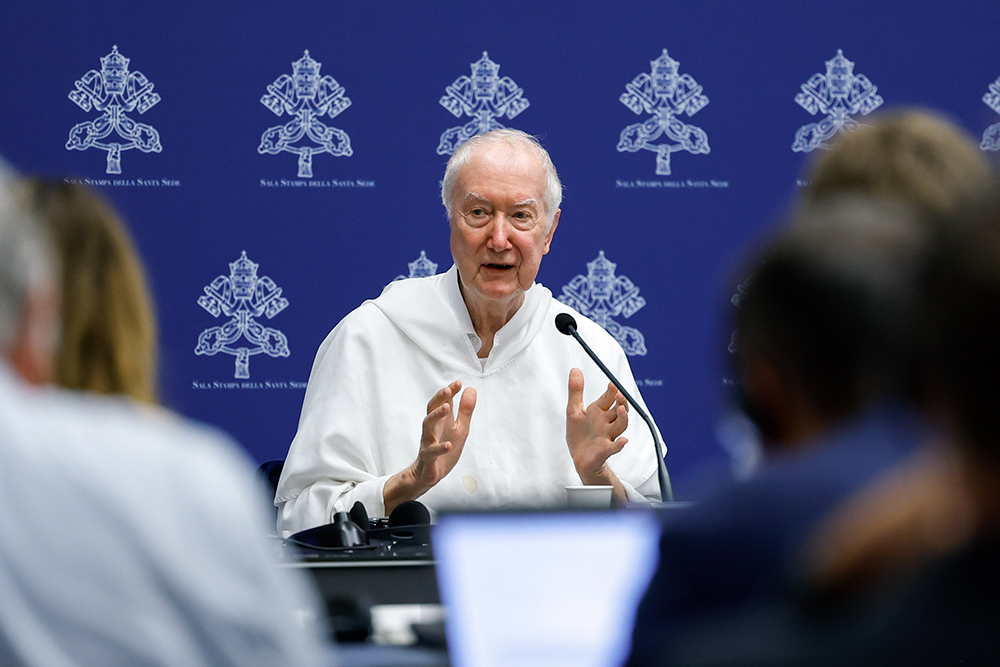
Dominican Fr. Timothy Radcliffe, spiritual adviser to the assembly of the Synod of Bishops, speaks during a briefing at the Vatican Oct. 27. (CNS/Lola Gomez)
Holding a Synod of Bishops with a much greater participation of non-bishops as voting members, particularly lay women and men, clearly expresses what it really means to be a bishop, said Dominican Fr. Timothy Radcliffe.
By having leaders of the Roman Curia, young women from Latin America or Asia and bishops all sitting together, this also "shows the bishop not as a solitary individual but immersed in the conversation of his people, listening, talking, learning together," Radcliffe, spiritual adviser to the synod, said at a Vatican briefing Oct. 27.
"I think this way of holding a synod reveals much more clearly than any previous synod I've been to what it means to be a bishop," he said.
"It is a synod that gathers to see how we can be church in a new way, rather than what decisions need to be taken" and to see "how we can be a church that listens to each other across cultures and listens to the tradition across time," said the former head of the Dominican order.
This approach is extremely important today in a world marked by growing violence, increasing polarization and "the collapse of communication," he said. "Somehow we have to learn how to talk to each other and listen to each other," which can be helpful in healing humanity and the church.
The Dominican priest was asked what practical steps could be taken to get more diocesan priests more involved in embracing or continuing the synodal process.
Advertisement
Radcliffe said a constant theme in this synod as well as in Pope Francis' teachings has been "a critique of clericalism, and I think many diocesan priests have found this alarming because it does seem to undermine a fundamental element of their identity."
"It's not enough just to be critical of clericalism, you have to positively evolve a supportive vision," he said. The church must "also find a way of sharing a positive view of the diocesan priesthood, of how belonging to the diocesan priesthood is something beautiful and wonderful, fraternal."
"Once you have that, then I think many more priests will be happy to come on board with the synodal process and begin in their own parishes to organize moments of listening together, praying together and learning together. But you cannot expect them to do that unless they have a feeling that their vocation is cherished," he said.
Responding to another question, the priest said that "many people fear the synodal way because they do not understand it" or they "see it in terms of a political debate" and worry "it might produce division and schism, whereas its whole purpose is of course not to do that."
He encouraged the media to help communicate the real purpose of the synod as "an event of prayer and faith."
Br. Alois, prior of the ecumenical Taizé Community, said at the briefing that it has been very "brave" of the pope and the Synod of Bishops to give so much space to listening.
Deep reflective listening, he said, "is completely countercultural because we want results, we want to advance immediately, and here (at the synod) there is a totally different approach, which is very fragile but deeply evangelical."
Radcliffe said, "since the 16th century we've been very tempted by a mechanical view of the world" in which "the world is a clock, God is the great clockmaker."
The world of politics "is very often seen as fixing problems," he said. But for the church, "we're concerned with a communion which is not mechanical."
"The church is an organism, a body, the body of Christ. And that means change is organic, and you can say ecological, rather than demanding a quick fix," he added.






